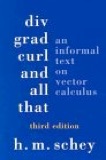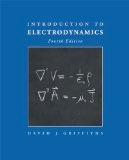Welcome to PHYS 340/640 - the second semester of the intermediate course on electricity and magnetism at WFU. To take this course it is recommended that you have taken:
1) Multi-variable calculus
2) Partial differential equations
3) Introductory physics
4) Physics 339 / 639
In this course, we will introduce advanced concepts of E&M along with a number of relevant modern examples of their applications. These concepts are also discussed in the text; Griffiths. Course lectures are designed to supplement readings and study from the text. They will provide a different perspective and context, following the text but not repeating it. So to really understand the course materials and topics, you must study the text and study the classroom discussion/lectures.
Specific Topics of the Course
Formulation of Magnetostatics
Introduction to electro- magneto- dynamics
Examination of Maxwell's Equations
You will find that the topics covered will overlap and provide background for several other courses in the Physics BS/BA curriculum. Specifically, the potentials discussed will become important in advanced quantum mechanics, the wave equations will set the foundations for Optics, and the magnetism components will lead to foundations of spin systems in solid state physics. It is strongly suggested that you try and make these connections if you are taking these courses concurrently or if you have taken them previously. It will make that material make a lot more sense.
Syllabus
I. The Magnetic Field and Vector Potential
II. Biot-Savart Law, Ampere's Law
III. Magnetic Materials
-
Inductance
Midterm exam
V. Maxwell's Equations
-
Waveguides/Antennae
-
The Near Field
-
Negative Index of Refraction
Final Exam
*HW will be assigned for each topical section above.
The Class
This class follows the topics as they appear in the text. However, presentation of topics in class are distinctly different from the text, offering a different perspective and approach. The class presentations and text presentation are meant to be used TOGETHER. The philosophy of the class is to discuss approaches and focus on the physical basis for the models used to solve problems.
Grading
The Class is made up of Lectures (which will be delivered on T/TH 12:30 to 1:40 with additional explanation and discussion), Weekly Homework, and Sectionals (problem solving sessions). Grading assessments will provide a determination of:
1) the quantity of work done by the student, (30% of grade)
2) the quality of work done by the student, (50% of grade)
3) the ability of the student to use concepts beyond what has already been presented to address unsuspected problems. (20% of grade)
How you get Graded:
10% Showing up to class and recitation, participating in discussions
20% Handing in the homework assignments with reasonable attempts to solve problems
50% Two, in class, quizzes. They are weighted 25% each. The problems will be variations of the homework. Work the HW and understand each problem, you will do well on the quizzes.
20% Challenge problems: take home portion of the quizzes. These problems are a little harder and add an additional 10% to the quiz. Generally, there will be 2 of these on each quiz.
Warning
-
1. As with many of today’s texts - the solutions to HW can be found on line. But the point of the HW is to illustrate how the principles outlined in class apply to a wide variety of physical situations. If you copy the HW from an online source, you may well miss this purpose and be unable to perform well on the exams.
-
2.Do not wait until the night before a HW set is due to begin work on it. At the very least read through the HW questions the day they are assigned. These can be lengthy and hard. But you are more ready to understand the question just after the material has been presented in class.
The exams have a unique structure. You will be given example problems that will occur on the in-class portion of the exam. You will get these problems several days before the exam. The problems on the exam may look different, but they will be there. It is your job to see how the principle is applied. There will also be a short, take home portion of the exam. This will have problems with a minimum of information and that requires a deeper level of reasoning. It is reasonable to expect that such problems may draw from information from previous courses to make your assumptions. The intention here is to make your experience with this new material integrated with the things you have learned previously. To prepare for these questions - the lectures will be particularly useful. You will not find them in the text or on the web - but we WILL practice the type of reasoning involved in class before the exam.
On the first type of question, you will be graded on your mastery of the mathematical skills required to solve the problems. On the second type of question - your reasoning counts and there may be more than one way to solve the problem.
Help With the Class
I am around and you can schedule office time to meet for help. However, there will also be problem sessions as well as in-class problem solving sessions. Every effort will be made to provide plenty of practice time - but it requires preparation and struggling with concepts. It is typically more useful to have tried a couple of routes to solution before seeing the solution worked out.










